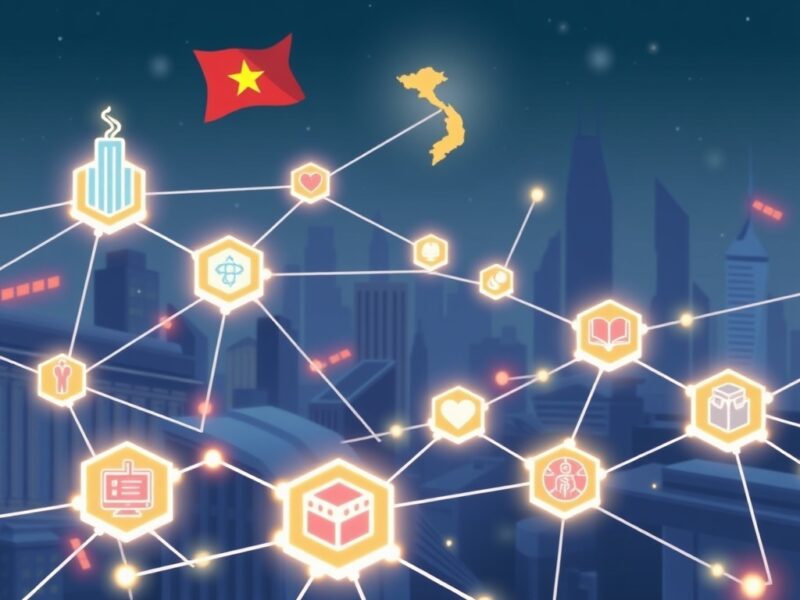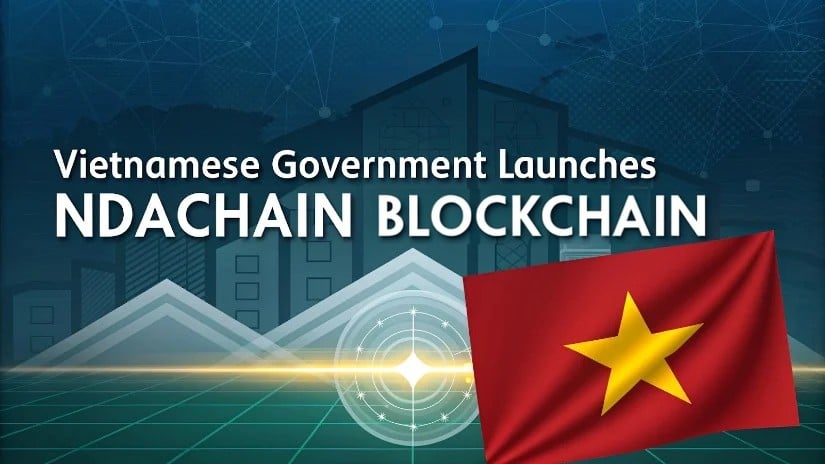Vietnam has just taken a giant leap into the future of digital innovation with the launch of NDAChain, a national blockchain platform that promises to revolutionize how data is managed and secured. Unveiled on July 25, 2025, this cutting-edge system can handle 3,600 transactions per second (TPS) and powers everything from digital IDs to product tracking. For everyday people, this means faster, safer, and more transparent digital services—think secure online IDs or verifying the authenticity of products with a quick scan. Let’s dive into what NDAChain is, how it works, and why it’s a big deal for Vietnam and beyond.
What Is NDAChain and Why Should You Care?
NDAChain is Vietnam’s first national blockchain, a permissioned Layer-1 platform developed by the National Data Association and managed by the Ministry of Public Security’s Data Innovation and Exploitation Center. Unlike public blockchains like Bitcoin, NDAChain is run by 49 trusted validator nodes, including government agencies and major companies like Zalo, SunGroup, and Masan. It uses a Proof-of-Authority (PoA) system, which prioritizes speed and trust, and Zero-Knowledge Proofs (ZKPs) to keep data private yet verifiable.

For the average person, NDAChain could make daily tasks like signing digital contracts or proving your identity online faster and more secure. With Vietnam ranking among the top five countries for crypto adoption—boasting over 20 million users—this blockchain is set to make digital services more reliable for millions.
How NDAChain Powers Vietnam’s Digital Future
Lightning-Fast Transactions at 3,600 TPS
NDAChain’s ability to process up to 3,600 TPS with just 0.5 seconds of latency makes it a powerhouse for high-volume tasks. Whether it’s handling government records, financial transactions, or healthcare data, this speed ensures smooth operations across sectors like e-government, education, and logistics. Compared to traditional systems prone to delays or cyberattacks, NDAChain acts like a super-secure digital highway for Vietnam’s data.
Digital ID and Fraud Protection
One of NDAChain’s standout features is NDA DID, a decentralized identity solution tied to Vietnam’s VNeID system. Imagine logging into a government portal or signing a contract online without worrying about identity theft. The NDAKey app lets users verify identities in seconds, cutting down on scams and fraud. This is a game-changer for anyone who’s ever hesitated to share personal info online.

Product Traceability with NDATrace
Ever wondered if that imported product is genuine? NDAChain’s NDATrace feature assigns unique digital codes to goods, compliant with global GS1 and EBSI standards. This lets consumers and businesses track products from factory to shelf, ensuring authenticity and boosting trust in Vietnam’s export markets. It’s like a digital passport for everything from coffee to electronics.
Why Vietnam’s NDAChain Stands Out Globally
Vietnam isn’t the first country to launch a national blockchain—China has BSN, the EU has EBSI, and South Korea has Klaytn—but NDAChain’s hybrid model is unique. It blends government oversight with private-sector innovation, allowing startups to build apps like digital wallets or anti-counterfeit tools on top of the platform. By adhering to international standards like GDPR and W3C DID, NDAChain ensures Vietnam’s systems can connect seamlessly with global networks.

This hybrid approach, praised by experts like Nguyen Huy of the National Data Association, balances speed and control while fostering innovation. It’s why posts on X are buzzing about NDAChain as a “pivotal shift toward sovereign digital empowerment.”
Challenges Ahead for NDAChain
Despite its promise, NDAChain faces hurdles:
Integration and Adoption
Rolling out a national blockchain isn’t easy. By the end of 2025, NDAChain will integrate with the National Data Center, with plans to reach local governments and universities by 2026. But getting millions of users and businesses to adopt it requires training and trust-building, especially for those unfamiliar with blockchain.
Balancing Centralization and Decentralization
NDAChain’s permissioned model, with only approved nodes, prioritizes efficiency but sacrifices some decentralization. Critics argue this could limit innovation compared to fully open blockchains. Vietnam will need to ensure its open architecture encourages startups while maintaining security.
Global Competition
Vietnam’s blockchain ambitions put it in competition with giants like China and the EU. Staying compatible with international systems and attracting foreign investment will be key to NDAChain’s long-term success.

What NDAChain Means for You
For everyday Vietnamese citizens, NDAChain could simplify life. Need to access government services? Your digital ID on NDAKey makes it quick and secure. Buying local products? NDATrace ensures they’re the real deal. For businesses, the platform’s smart contracts and traceability tools could cut costs and open new markets, especially for exports.
By 2030, Vietnam aims to be a digital economy leader in Southeast Asia, with NDAChain powering financial hubs in Ho Chi Minh City and Danang. This could mean more jobs in tech and easier access to global markets for small businesses. Plus, with 20% of Vietnam’s population already using crypto, NDAChain’s launch signals a future where blockchain is as common as mobile apps.
The Road Ahead: Vietnam’s Blockchain Vision
NDAChain is more than a tech project—it’s a cornerstone of Vietnam’s National Blockchain Strategy (Decision No. 1236/QĐ-TTg, 2024). By 2026, the government plans to roll out 20 major blockchain platforms and establish Vietnam as a top-10 Asian research hub. Pilot programs for digital assets and crypto trading are also in the works, hinting at a broader embrace of blockchain innovation.
Whether you’re a student, a small business owner, or just curious about tech, NDAChain’s launch is a sign of exciting changes. It’s about making digital services faster, safer, and more trustworthy—something we all want in an increasingly connected world.
Disclaimer: Blockchain technology is complex and evolving. Stay informed through trusted sources before engaging with new platforms.






















